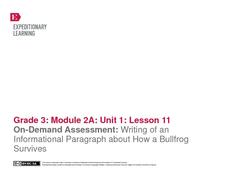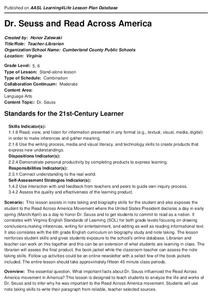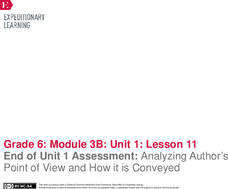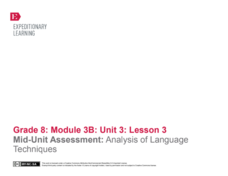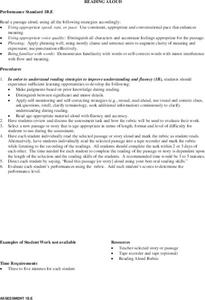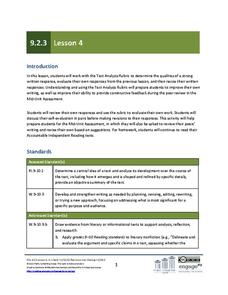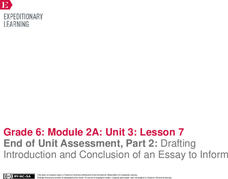EngageNY
On-Demand Assessment: Writing of an Information Paragraph About How a Bullfrog Survives
Having read and discussed Bullfrog at Magnolia Circle, third graders demonstrate their bullfrog expertise by writing informational paragraphs. Building on the note-taking and paragraph planning from the previous lesson plan, learners...
Curated OER
Dr. Seuss and Read Across America
What important facts about Dr. Seuss influenced the Read Across America movement...? This is the driving question of a research project that requires scholars to find information about Dr. Seuss' life and work. Class members write a...
EngageNY
Mid-Unit Assessment: Analyzing Author’s Purpose in Speech and Text
Part one of a mid-unit assessment relating to The Omnivore’s Dilemma includes listening to and analyzing a speech by Birke Baehr. Part two involves analyzing an excerpt from the text. The assessment ends with short response questions.
EngageNY
End of Unit Assessment: On-Demand Informational Paragraph About How the Poison Dart Frog Survives
A final assessment marks the end of a unit that takes a close look at a variety of informational texts all about frogs. A graphic organizer aides scholars in planning an accordion paragraph using their recorder forms from previous...
EngageNY
Mid-Unit Assessment: Using Evidence to Support Analysis: “Frederick Douglass”
Show what you know! Scholars complete a mid-unit assessment using text evidence from Frederick Douglass. The teacher then presents expectations for independent reading assignment. Leaving the class, pupils turn in an exit ticket...
EngageNY
Mid-Unit Assessment: Justification for Character and Scene Selection
When it comes to love and midsummer nights, confessions are tricky. Learners place themselves in the shoes of a character from William Shakespeare's A Midsummer Night's Dream and explain how a character manipulated another character in...
EngageNY
Mid-Unit 1 Assessment: Figurative Language and Word Choice in Bud, Not Buddy (Chapter 5)
Individuals utilize the strategies practiced in the previous lesson to complete a mid-unit assessment on figurative language and how Christopher Paul Curtis uses word choice to create meaning in Bud, Not Buddy.
Maryland Department of Education
The Concept of Diversity in World Literature Lesson 8: Nonfiction Close Reading
As part of their study of Things Fall Apart, class members conduct a close reading of a section of Chinua Achebe's essay, "An Image of Africa: Racism in Conrad's Heart of Darkness." Jigsaw groups then compare the voice in the essay...
Curated OER
Reading With Fluency And Expression
Practice makes perfect, and this lesson provides a rubric to prove it! To improve their ability to read with fluency and expression, readers listen to a series of online stories in order to hear how a well-read story should sound. They...
EngageNY
End of Unit 3 Assessment: Writing a Research Synthesis
Ready, set, write! Scholars work on the end-of-unit assessment by completing a writing prompt. They then look at the model performance task from instructional activity two to create a rubric for scoring the exercise. Using turn and talk,...
Achieve3000
Oral Reading Fluency
Accuracy, phrasing, flow, and pace, the four traits of of oral reading fluency, are the focus of a series of exercises that are designed to help readers develop these comprehension and literacy skills.
EngageNY
Mid-Unit 1 Assessment: Analyzing an Interview with a Rainforest Scientist Part 1
What's it like to study snakes, reptiles, and turtles in their natural habitats? Serving as the mid-unit assessment, pupils read an interview with a rainforest scientist. Next, they analyze the text and answer text-dependent questions.
ReadWriteThink
Promoting Student Self-Assessment
Keep class members accountable for their own learning with a series of differentiated instruction strategies. From rubrics created by pupils to learning contracts written at the beginning of the year, the resource offers multiple ways...
EngageNY
End of Unit 1 Assessment: Analyzing Author’s Point of View and How it is Conveyed
One step at a time. Scholars complete the end of unit assessment by reading pages 70–75 of World without Fish and analyzing each paragraph one at a time. They highlight key words leading to author's point of view and complete a point of...
EngageNY
Mid-Unit Assessment: Analysis of Language Techniques
Show what you know. Learners demonstrate mastery of English grammar and usage by completing a pen-and-paper assessment of verbals and verb shifts. In addition, they begin composing a book review based on an independent reading book. The...
EngageNY
Mid-Unit Assessment: Analyzing Idea Development in Chapter 3 of World without Fish
Half way there. Scholars work on the mid unit assessment for World without Fish. Learners work independently to complete the assessment. They then answer text-dependent questions and use sticky notes for annotating.
Curated OER
Reading Aloud
Reading aloud is a great way to engage learners in pacing and pronunciation! They practice using voice, pitch and intonation correctly. The teacher introduces the lesson plan by example, correctly stressing punctuation and using...
EngageNY
Grade 9 ELA Module 2, Unit 3, Lesson 4
What are the qualities of a strong written response to a prompt? Class members use the provided text analysis rubric to self-assess their responses to their homework assignments to prepare for the mid-unit assessment.
EngageNY
Grade 9 ELA Module 1, Unit 2, Lesson 4
As a mid-unit assessment, class members demonstrate their understanding of the concepts covered so far by crafting a formal, multi-paragraph essay in which they analyze how Rainer Maria Rilke's word choices develop the meaning and tone...
Digital Writing and Research Lab's – Lesson Plans
Teaching Close Reading through Short Composition/Revision
This activity may have writers evaluate short compositions, but their subjects are quite tall: great Americans. Pupils read one another's compositions and closely examine how specific phrases and diction contribute to shaping American...
Curated OER
Using the Sounds of Words Reading Task
Young readers demonstrate phonemic awareness in words and blends, and recognize 100 high-frequency words. Use a nursery rhyme to point out rhyming words, and change the words by putting a new letter at the beginning. Each learner will...
EngageNY
Writing to Inform: Analyzing a Model Using a Rubric
Learn to write right. Scholars analyze the model essay Adversity Faced by Townspeople in the Middle Ages. They discuss the essay and make annotations working with an elbow partner. Learners then take another look at the essay using a...
EngageNY
End of Unit Assessment, Part 2: Drafting Introduction and Conclusion of an Essay to Inform
A powerful introduction and conclusion can really pack a punch. Using the resource, scholars first read and discuss a model essay. Then, as part of the end of unit assessment, they draft the introductory and concluding paragraphs of...
EngageNY
End of Unit Assessment: Tracing and Evaluating Arguments
Give water the attention it deserves. Scholars watch Corporations Need to Pay More Attention to Water and respond to questions as part of their end of the unit assessment. They then complete the assessment by reading and responding to...


